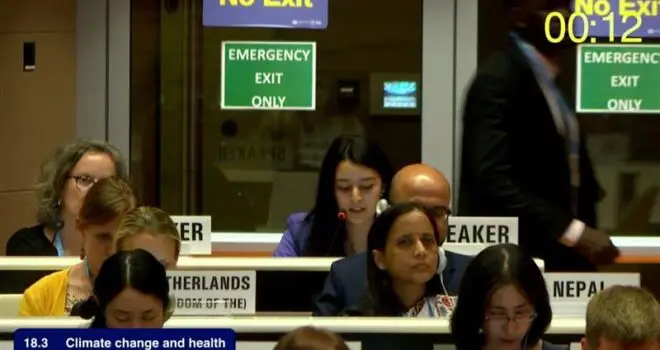This is a statement made at the 75th World Health Assembly (22-28 May 2022) on Agenda Item 14.1: Follow-up to the political declaration of the third high-level meeting of the General Assembly on the prevention and control of non-communicable diseases; Annex A: Draft implementation road map 2023–2030 for the global action plan for the prevention and control of noncommunicable diseases 2013–2030
Honourable Chair, Distinguished Delegates,
We are three years away from the next UN High-Level Meeting on NCDs and WHA75’s NCD-related agenda highlights the importance of action on NCDs and mental health, including for CVD, suicide prevention and dementia, at all levels and at all times – through pandemics and conflicts. Too many people living with NCDs are currently being left behind.
We commend the emphasis on the inclusion of the meaningful involvement of people with lived experience in the development of services as outlined within the implementation roadmap. This will catalyse action where it has been insufficient, enabling the roll out of people-centred, impactful NCD prevention and health promotion, screening, management and palliative care services throughout the life course, pre-requisites if UHC and SDG targets are to be achieved by 2030.
We urge Member States to:
- Adopt the omnibus decision on Agenda Item 14.1.
- Integrate NCD and mental health indicators in health systems performance and access metrics to rectify the key gaps in existing global NCD targets, particularly lack of targets for those under 30 and over 70 years; living with comorbidities and neglected NCDs.
- Engage with the proposed guidance for whole-of-government and whole-of society action and on benefits and risk management approaches for multi-stakeholder engagement to guard against unhealthy industry interference in policy making.
- Step-up investment through sustainable financing, including through the UN MPTF, in NCD, mental and oral health services, together with essential medicines and products, to protect progress achieved to date and catalyse action where this is lacking, promoting equity. A recent Lancet health policy paper demonstrates that with basic investments in NCDs, aligned with WHO’s Best Buys, nearly all countries including low- and middle-income countries could achieve the SDG 3.4 target by 2030 whilst providing a 19:1 return on investment.
Statement delivered on behalf of:
Alzheimer’s Disease International
Global Health Council
International Association for Suicide Prevention
International Diabetes Federation
International Society of Nephrology
Movendi International
World Cancer Research Fund International
World Heart Federation
World Stroke Organization
Supported by:
NCD Alliance


